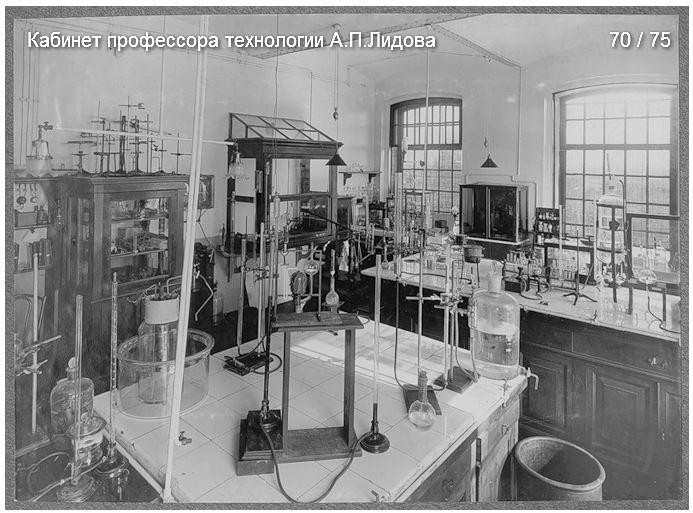Department of Technology of organic substances and dye substances
The department of organic synthesis and nanotechnology, as well as institute as a whole, has its calendar since 1885, when the two departments were organized, one of which was called the Department of technology of organic substances and dye substances. The department conducted training engineers in a number of areas of chemical technology: organic dyes, paper, leather, fat, sugar, alcohol-distillation, dry distillation of wood, oil and gas processing and others.
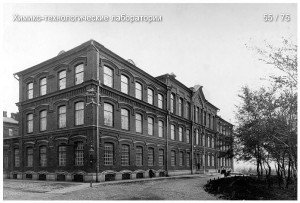 Since 1885 the priority of development was given to training engineers of dyeing substances and dyeing technology, processing of fat, and since 1910 begun the training of engineers coke-benzene production.
Since 1885 the priority of development was given to training engineers of dyeing substances and dyeing technology, processing of fat, and since 1910 begun the training of engineers coke-benzene production.
The department has undergone a most significant reorganization in the years 1929-1950, when it divided into a number of branch institutions, and among them the Kharkov Institute of Chemical Technology was organized. The department of Technology of organic and dye substances has been divided into 3 graduate departments: Department of coke-benzene production, the Department of technology of organic dyes and intermediates and the Department of technology of fat.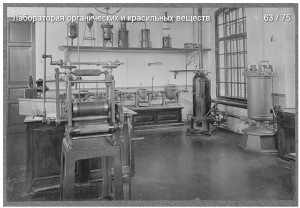
In 1933 the Department of coke-benzene production was renamed into the Department of Technology of pyrogenic processes, in 1946 – into the Department of chemical technology of fuel and in 1959 – into the Department of chemical technology of solid fuel.
In 1975 the two departments of Chemical Engineering of solid fuel and technology of organic dyes and intermediates merged into one which was named the Department of technology of organic substances.
First lectures on the technology of organic substances
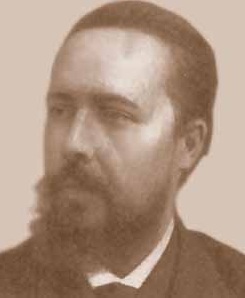
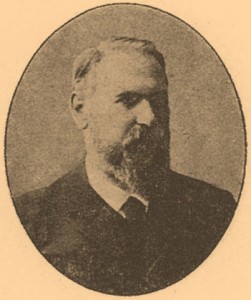 The first lectures on the technology of organic dyes and their use, were given to the 4th year students in 1888 by Professor V.A. Hemilian, an apprentice of D.I. Mendeleev and colleague of A.M. Butlerov.
The first lectures on the technology of organic dyes and their use, were given to the 4th year students in 1888 by Professor V.A. Hemilian, an apprentice of D.I. Mendeleev and colleague of A.M. Butlerov.
In January 1889, Alexander Pavlovich Lidov (1853-1919) was invited to the department of organic and dye substances as an assistant/lecturer, who in 1892 became head of the department until 1919.
As well as giving lectures, A.P. Lidov tutored the students` diploma projects in dry distillation of wood and managed an oil and gas refinery plant.
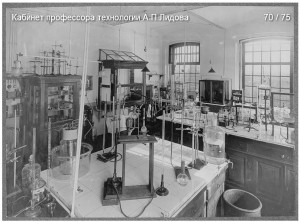 After Lidov’s death in Crimea in 1919, professor Methodius Ivanovich Kuznetson became head of the department of technology of organic and dye substances. He is a graduate of institute of 1904, left to work in the department as a laboratory assistant. In 1912, M.I. Kuznetsov published a first ever textbook in Russian on production of coke and carbonized products, which for many years was the only textbook in this field.
After Lidov’s death in Crimea in 1919, professor Methodius Ivanovich Kuznetson became head of the department of technology of organic and dye substances. He is a graduate of institute of 1904, left to work in the department as a laboratory assistant. In 1912, M.I. Kuznetsov published a first ever textbook in Russian on production of coke and carbonized products, which for many years was the only textbook in this field.
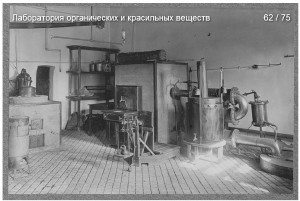 In 1929, professor G.N. Gulin was appointed head of the department of dyes and intermediate products, and in 1935, in connection with his departure due to illness, the department was headed by its graduate Peter Prokhorovich Karpuhin (1902- 1974).
In 1929, professor G.N. Gulin was appointed head of the department of dyes and intermediate products, and in 1935, in connection with his departure due to illness, the department was headed by its graduate Peter Prokhorovich Karpuhin (1902- 1974).
In 1936, a research and development manufacturing was founded in the institute. What’s more, is the organic synthesis division was the primary one. Professor Karpuhin with the help of the staff, developed the technology and successfully tested a series of thioindigoid dyes.
Department of technology of organic substances during Second World War
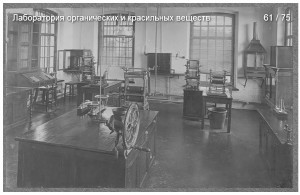 On October 24, 1941, German invaders occupied Kharkov. In 1942, in the evacuated institute, the department of pyrogenic processes was founded.
On October 24, 1941, German invaders occupied Kharkov. In 1942, in the evacuated institute, the department of pyrogenic processes was founded.
During the Second World War, in the evacuation in a town called Chirchik, prof. Karpuhin, his associate P.I. Mikhailenko, G.K. Goncharenko and some other members of the department, have launched works on defense projects, in particular for the production of trinitrotoluene (TNT) from processing Ferghana oil, and also developing the technology and the factory installment project of neozone manufacturing.
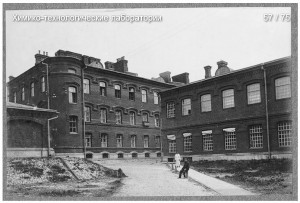 After re-evacuation the institute back to Kharkov, the department of technology of organic dyes, led by prof. Karpukhin, returned to its original research in the synthesis of dyes and their intermediates.
After re-evacuation the institute back to Kharkov, the department of technology of organic dyes, led by prof. Karpukhin, returned to its original research in the synthesis of dyes and their intermediates.
Before the Second World War, the department graduated specialists, who mastered mainly in the chemistry of coke and gasification, only a few graduates carried out their diploma projects in hydogenization of coal and partial carbonization of turf. After the Second World War, the department mainly graduated chemists of coke, but from 1947 to 1958, an annual number of 6-8 engineers were the ones that mastered at manufacturing carbon and graphite, and of carbon-electro materials and products.
Department of technology of organic substances in the postwar period
After the restoration and integrating the department of the technology of fuel into the Kharkov Polytechnical Institute, the research projects continued in 2 main branches:
- Research and development of new and intensification of already existing technological processes of processing coal and coke chemical products.
- Studying the theoretical problems of chemistry and carbonizing the coal.
Since 1967 the department under the guidance of professor K.A Belov successfully carried out the following research work:
- the use of “small cold” technology to improve capture of benzene hydrocarbons from coconut gas;
- research to reduce the losses of crude benzene rectification while storage;
- research to develop methods of producing high-quality non-consolidating during storage ammonium sulfate;
- research on carbonizing coal in laboratory and industrial conditions;
- research on obtaining metallurgic coal from non-conglomerate, mildly conglomerate and highly conglomerate coal.
Training specialists at the department of technology of organic substances
Since September 1975, a new departments on the basis of the departments of chemical technology of solid fuel and technology of organic dyes, a new department was created – the department of technology of organic substances, headed by a professor. K.A. Belov. Since 1986 the department was headed by Professor M.H. Sklar, and 1989, professor A.G. Belobrov stayed in that position.
Under his leadership, and to this day, the department of technology of organic substances trains specialists on full-time and off-campus study courses.
Specializations of the department of chemical technology of organic substances:
- technology of organic dyes and luminophores;
- pharmaceutical technology and fragrant substances;
- alcohol production technology.
A new chapter. Organic synthesis and nanotechnology department
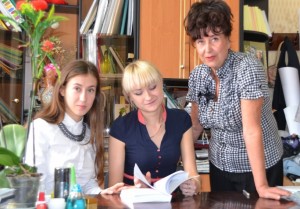
Since 2010, the department is headed by Professor L.V. Krichkovskaya. The department name is changed to the Department of organic synthesis and nanotechnology. in 2012, the Department has been certified and obtained the second specialty “Chemical technology of food supplements and cosmetics”.
Specializations of Chemical technology of food supplements and cosmetic products:
- food supplements technology;
- technology cosmetics.
Currently the department graduates specialists of two levels of training: Bachelor and Master’s degree. After the master’s degree graduates have the right to go to graduate school.

